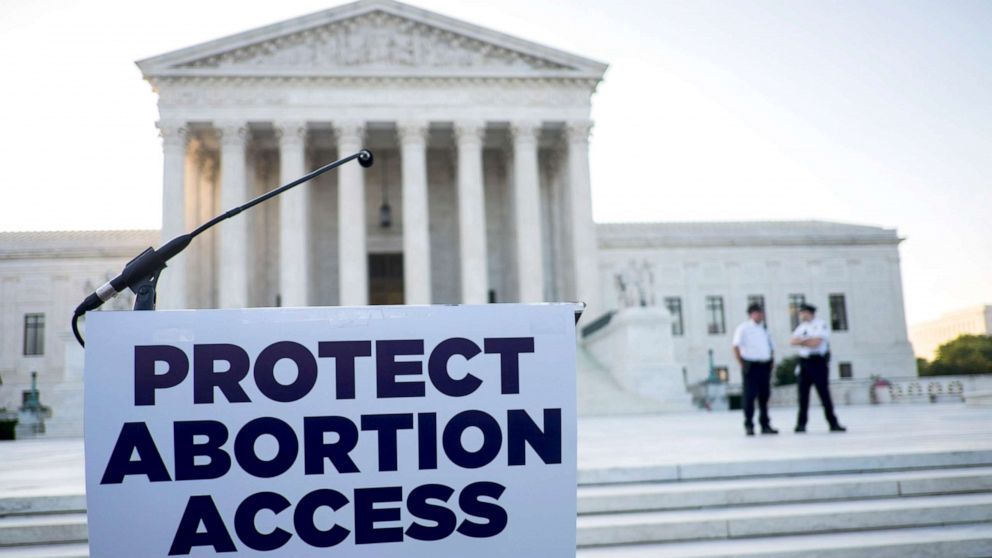Supreme Court set to hear critical Louisiana abortion case
Four years after striking down a Texas law it said created an "undue burden" on abortion access, the Supreme Court is poised to take up a similar challenge.
June Medical Services v. Russo (previously v. Gee) is a challenge from Louisiana abortion providers to a 2014 state law that requires abortion providers to have admitting privileges with a nearby hospital. Hospital admitting privileges are an agreement between a doctor and a hospital that allows a patient to go that hospital if they need urgent care.
It may not sound like an arduous requirement, but the plaintiff argues that the stipulation, if enforced, would effectively eliminate abortion access throughout the state.
Currently, according to attorneys from the Center for Reproductive Rights arguing for June Medical, there are two abortion providers with admitting privileges in Louisiana. But attorneys say that if the law were enforced, there would likely be only one left.
"These kinds of laws are completely constructed as a way to making it even more difficult or impossible for abortion clinics to operate in these jurisdictions," Kimberly Mutcherson, co-dean and law professor at Rutgers Law School, told ABC News.
The Supreme Court is hearing oral arguments for this case on Wednesday.
This law may sound familiar.
In 2016, the Supreme Court ruled that a virtually identical law in Texas was unconstitutional in Whole Woman's Health v. Hellerstedt, saying the law created an "undue burden" on abortion access.
Politicians enacted that law with the stated intention of improving patients' health benefits, but evidence cited in the subsequent Supreme Court case showed that since abortion is considered a safe, non-surgical procedure that very rarely requires hospital treatment, hospital admitting privileges did not improve outcomes -- but, rather, caused abortion clinics to close as doctors could not obtain those privileges.
"In our view, the record contains sufficient evidence that the admitting-privileges requirement led to the closure of half of Texas' clinics, or thereabouts," Justice Stephen Breyer wrote in the 2016 opinion. "Those closures meant fewer doctors, longer waiting times, and increased crowding."
In fact, abortion providers say, the infrequent rate at which abortion providers send patients to hospitals makes it difficult for those physicians to gain admitting privileges, because hospitals have little incentive to enter into agreements that are rarely utilized. Additionally, hospitals face a disincentive to offer privileges because the stigma of abortion could expose them to criticism and protests. Finally, say advocates, the necessity of such agreements is itself questionable, as hospitals, by nature, accept patients who show up, with or without a doctor agreement.
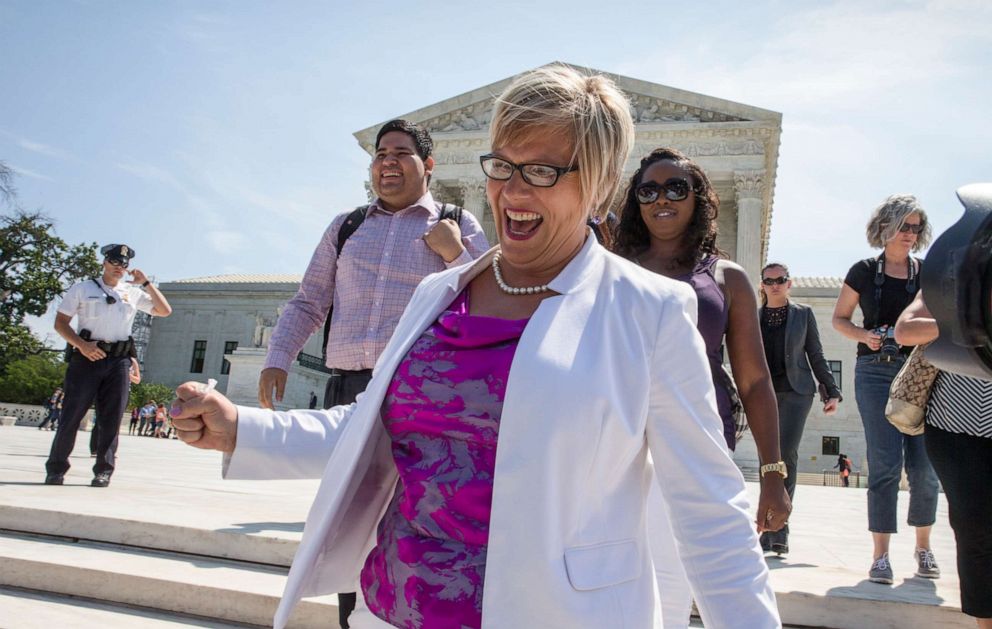
The Louisiana attorney general in a February statement rejected the idea that providers have difficulty obtaining admitting privileges and claimed that their law "does not force clinic closures."
In the Texas case, which also involved another stipulation requiring facilities where abortions are provided to meet the requirements of an ambulatory surgical center, the Supreme Court created a precedent that laws like Texas' that "do little or nothing for health, but rather strew impediments to abortion cannot survive judicial inspection," Justice Ruth Bader Ginsburg wrote in a concurring opinion, referencing a lower court case.
"We have found nothing in Texas' record evidence that shows that, compared to prior law (which required a 'working arrangement' with a doctor with admitting privileges), the new law advanced Texas' legitimate interests in protecting women's health," Breyer wrote.
Louisiana state Sen. Katrina Jackson, a Democrat who proposed the Louisiana law, has repeatedly referred to it as "a women's health piece of legislation." ABC News could not reach Jackson for comment.
So why are admitting privileges back at the Supreme Court?
The Louisiana law, Act 620, was signed in 2014, a year after Texas' was signed. In 2016, the Supreme Court ruled Texas' law unconstitutional. In April 2017, a district court struck down Louisiana's, referring to the Supreme Court opinion.
But the state appealed that decision, and in September 2018, the Fifth Circuit Court of Appeals surprisingly reversed the opinion, approving Louisiana's law.
"The lawyer in me was flabbergasted, because the Fifth Circuit did things that even law students know appeals courts aren't supposed to do," TJ Tu, a co-counsel on the case for the Center for Reproductive Rights, told ABC News. "The Fifth Circuit did not faithfully apply Supreme Court precedent, and just as bad, the Fifth Circuit completely disregarded the trial court's factual findings."
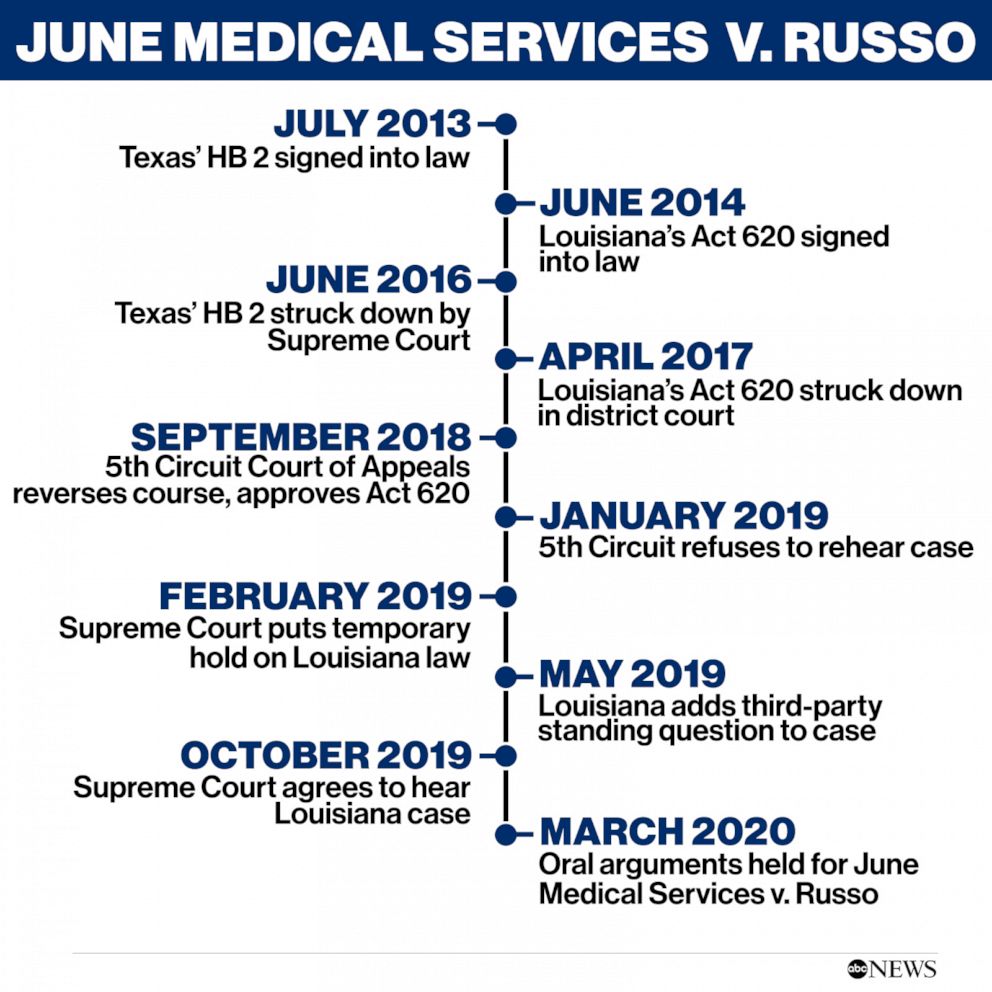
The Fifth Circuit refused to rehear the case in January 2019, and in February 2019, the Supreme Court stepped in, putting a temporary hold on Louisiana's Act 620. In October 2019, the Supreme Court announced they were picking up the case.
Tu argued the Supreme Court "had to take on this case" because the Fifth Circuit's ruling was "mind-boggling."
"Even if the Supreme Court didn't want to wade into the abortion debate this year, the Fifth Circuit really left the court in a difficult position with very limited options, because the Supreme Court had to take the case to make clear that its precedents should be the law of the land," Tu told ABC News.
A last-minute twist in the case.
In May 2019, after years of litigation, the state of Louisiana threw in a new twist. In a request to the Supreme Court, the state argued that abortion providers and clinics should not be legally allowed to even challenge the law in the first place.
The state is questioning what's called "third-party standing," which means that a third party -- like an abortion provider -- is allowed to argue on behalf of the person actually impacted -- a patient.
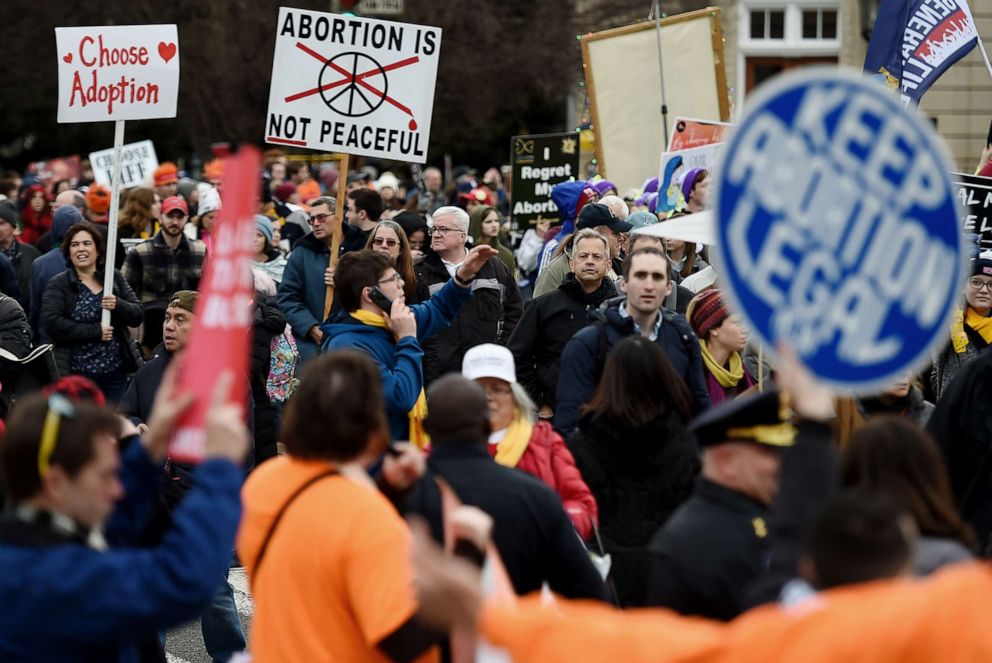
While Roe v. Wade, the landmark 1973 case that declared abortion a protected right, included an individual patient challenging the law, every major abortion case since then has been presented by providers and clinics like Whole Woman's Health, Planned Parenthood or June Medical Services.
"There is little evidence that their patients' interests actually align with Plaintiffs' position that the burdens of such protections exceed their value," the state wrote in the petition. "On the contrary, undisputed record evidence (including of Plaintiffs' poor safety record, inadequate credentialing practices, and questionable efforts to undermine the law at issue) shows Plaintiffs are directly adverse to their patients' interests. It is hard to imagine a worse case for third-party standing."
Should the Supreme Court make a ruling on this portion of the case, it could have major implications for all future abortion litigation. Abortion-rights advocates say it may be difficult to find individuals to challenge abortion laws given the limited time one has to get an abortion and the risks of being targeted by anti-abortion advocates.
A changed court since 2016.
The Louisiana admitting privileges law may look similar to Texas' law, but the look of the Supreme Court has changed since 2016.
In the Whole Woman's Health case, Breyer with the majority was joined by the more liberal-leaning justices -- Ginsburg, Sonia Sotomayor and Elena Kagan. But to get the majority, they needed one more vote, and they got that from Justice Anthony Kennedy, who during his tenure represented the swing vote on abortion cases.
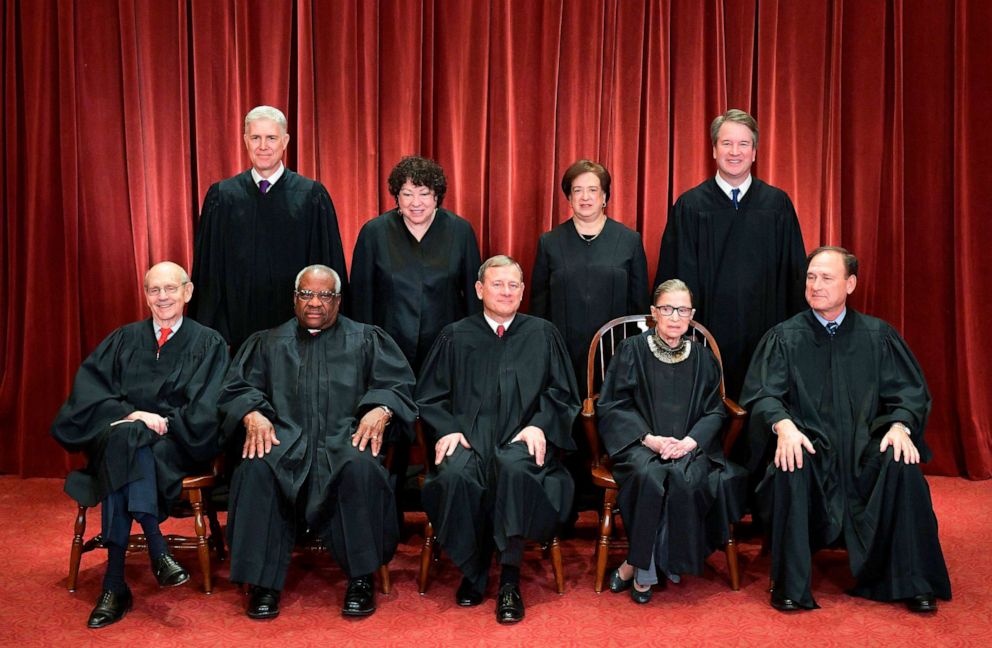
But following Kennedy's retirement in 2018 and the death of Justice Antonin Scalia in 2016, their replacements -- Neil Gorsuch and Brett Kavanaugh -- are seen as more conservative. As a result, the Supreme Court no longer has an abortion swing vote, although many observers believe that Chief Justice John Roberts could take on that role.
Tu, for his part, believes that Roberts at least will be moved by the idea of not overturning past precedent.
Mutcherson, from Rutgers, however, found it "ominous" that the new court took on the case.
"To re-litigate that ... so close to when it was had in Whole Woman's Health doesn't suggest that the goal is just to reinforce what they said in that case," she told ABC News. "It suggests that they want to either weaken Whole Woman's Health or weaken Roe."
What are the actual stakes of this case?
An amicus or "friend of the court" brief filed in January on behalf of 207 members of Congress -- all but two of whom are Republicans -- asked the Supreme Court to consider using this case to reconsider or overrule Roe v. Wade, stating that the 1973 decision is "haphazard."
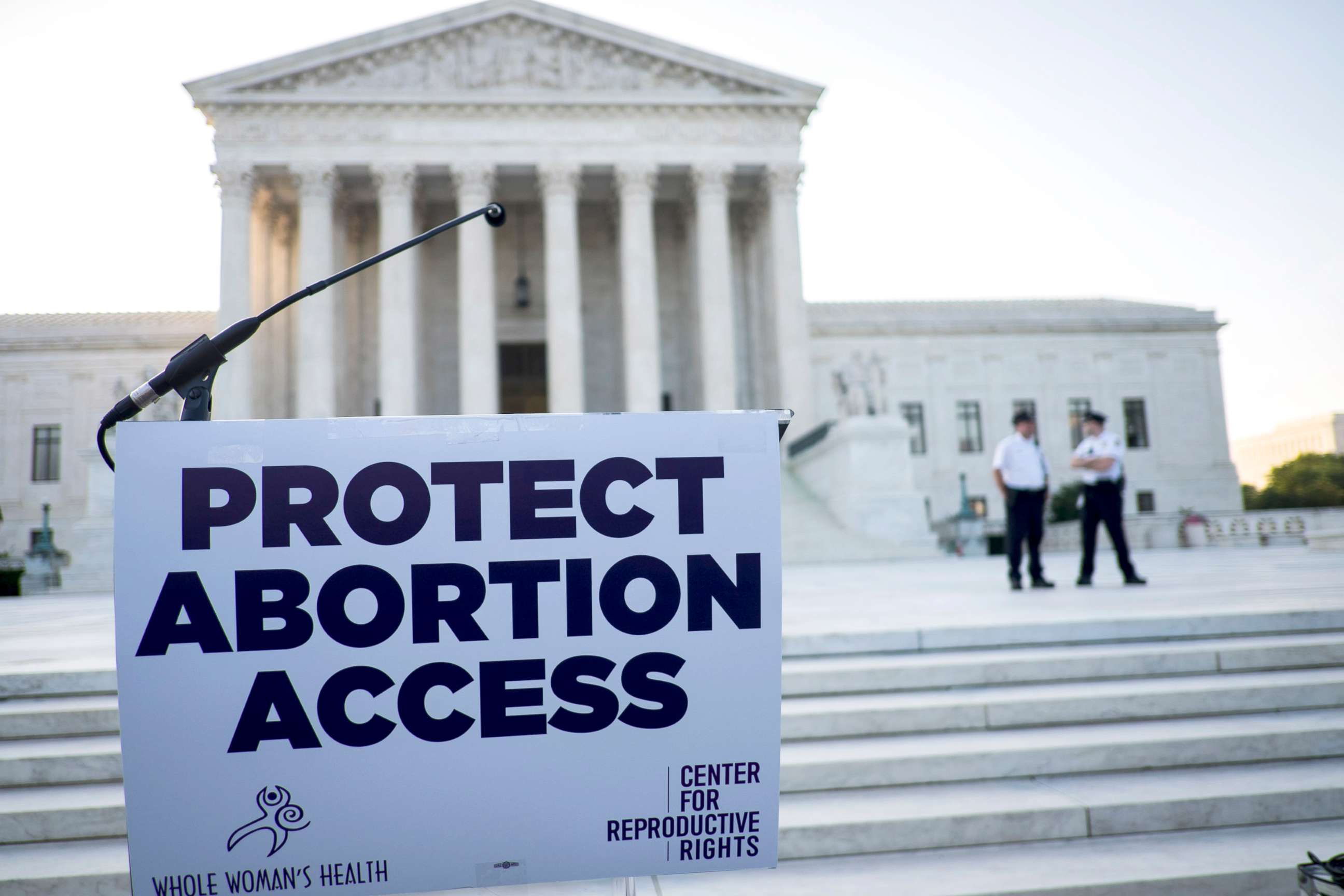
Notwithstanding this brief, however, abortion-rights advocates say that June Medical Services v. Russo does not challenge Roe.
"Roe v. Wade is not directly on the chopping block in our case. But people really shouldn't take much comfort in that," Tu told ABC News, arguing that should Louisiana's admitting privileges law be allowed to stand, the right to an abortion there would effectively be taken away, making Roe "a theoretical right" in Louisiana rather than a real one.
Mutcherson said she is "significantly worried" this Supreme Court would say this kind of law is acceptable, which, she said, would also reinforce the idea that abortion is unsafe -- which statistics show it is not.
"Without overturning Roe at all," she said, the Supreme Court approving laws like this would "make abortion access in this country even more fraught," especially for vulnerable populations like women of color, poor and undocumented women.
Tu believes the most likely outcome is for the Supreme Court to avoid the third-party question, and he is hopeful the justices will stand behind the precedent they set in 2016 with Whole Woman's Health.
"The stakes are nevertheless extraordinarily high for women in states like Louisiana, where effectively, abortion access will be eradicated," he said.
